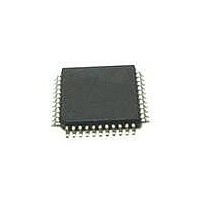MC9S08JM16CLD Freescale Semiconductor, MC9S08JM16CLD Datasheet - Page 320

MC9S08JM16CLD
Manufacturer Part Number
MC9S08JM16CLD
Description
MCU 8BIT 16K FLASH 44-LQFP
Manufacturer
Freescale Semiconductor
Series
HCS08r
Datasheet
1.DEMO9S08JM16.pdf
(386 pages)
Specifications of MC9S08JM16CLD
Core Processor
HCS08
Core Size
8-Bit
Speed
48MHz
Connectivity
I²C, LIN, SCI, SPI, USB
Peripherals
LVD, POR, PWM, WDT
Number Of I /o
33
Program Memory Size
16KB (16K x 8)
Program Memory Type
FLASH
Ram Size
1K x 8
Voltage - Supply (vcc/vdd)
2.7 V ~ 5.5 V
Data Converters
A/D 8x12b
Oscillator Type
External
Operating Temperature
-40°C ~ 85°C
Package / Case
44-LQFP
Processor Series
S08JM
Core
HCS08
Data Bus Width
8 bit
Data Ram Size
1 KB
Interface Type
I2C, SPI
Maximum Clock Frequency
48 MHz
Number Of Programmable I/os
33
Number Of Timers
2
Operating Supply Voltage
2.7 V to 5.5 V
Maximum Operating Temperature
+ 85 C
Mounting Style
SMD/SMT
3rd Party Development Tools
EWS08
Development Tools By Supplier
DEMOJM, DEMOJMSKT, DEMOFLEXISJMSD, DEMO9S08JM16
Minimum Operating Temperature
- 40 C
On-chip Adc
12 bit, 8 Channel
Controller Family/series
HCS08
No. Of I/o's
33
Ram Memory Size
1KB
Cpu Speed
48MHz
No. Of Timers
2
Embedded Interface Type
I2C, SCI, SPI
Rohs Compliant
Yes
Lead Free Status / RoHS Status
Lead free / RoHS Compliant
Eeprom Size
-
Lead Free Status / Rohs Status
Lead free / RoHS Compliant
Available stocks
Company
Part Number
Manufacturer
Quantity
Price
Company:
Part Number:
MC9S08JM16CLD
Manufacturer:
Freescale Semiconductor
Quantity:
10 000
- Current page: 320 of 386
- Download datasheet (8Mb)
Universal Serial Bus Device Controller (S08USBV1)
The USB has two sources of data overrun error:
In the first case, the USB will respond with a NAK or bus timeout (BTO) as appropriate for the class of
transaction. The BTOERR bit will be set in the ERRSTAT register. Depending on the values of the
INTENB and ERRENB register, USB module may assert an interrupt to notify the CPU of the error. In
device mode the BDT is not written back nor is the TOKDNE interrupt triggered because it is assumed
that a second attempt will be queued at future time and will succeed.
In the second case of oversized data packets, the USB specification assumes correct software drivers on
both sides. The overrun is not due to memory latency but to a lack of space to put the excess data. NAK'ing
the packet will likely cause another retransmission of the already oversized packet data. In response to
oversized packets, the USB module will still ACK the packet for non-isochronous transfers. The data
written to memory is clipped to the MAXPACKET size so as not to corrupt the buffer space. The USB
module will assert the BUFERRF bit of the ERRSTAT register (which could trigger an interrupt, as above)
and a TOKDNE interrupt fails. The BDTKPID field of the BDT will not be “1111” because the BUFERRF
is not due to latency. The packet length field written back to the BDT will be the MAXPACKET value to
represent the length of the clipped data actually written to memory. From here the software can decide an
320
•
•
The memory latency to the local USB RAM interface may be too high and cause the receive buffer
to overflow. This is predominantly a hardware performance issue, usually caused by transient
memory access issues.
The packet received may be larger than the negotiated MAXPACKET size. This is caused by a
software bug.
Interrupt Generated
SETUP TOKEN
OUT TOKEN
IN TOKEN
USB RST
USBRST
= USB Host
MC9S08JM16 Series Data Sheet, Rev. 2
Figure 17-20. USB Packet Flow
DATA
DATA
DATA
SOF
= Function
Interrupt Generated
SOF
ACK
ACK
ACK
Interrupt Generated
Interrupt Generated
Interrupt Generated
TOKDNE
TOKDNE
TOKDNE
Freescale Semiconductor
Related parts for MC9S08JM16CLD
Image
Part Number
Description
Manufacturer
Datasheet
Request
R
Part Number:
Description:
Manufacturer:
Freescale Semiconductor, Inc
Datasheet:
Part Number:
Description:
Manufacturer:
Freescale Semiconductor, Inc
Datasheet:
Part Number:
Description:
Manufacturer:
Freescale Semiconductor, Inc
Datasheet:
Part Number:
Description:
Manufacturer:
Freescale Semiconductor, Inc
Datasheet:
Part Number:
Description:
Manufacturer:
Freescale Semiconductor, Inc
Datasheet:
Part Number:
Description:
Manufacturer:
Freescale Semiconductor, Inc
Datasheet:
Part Number:
Description:
Manufacturer:
Freescale Semiconductor, Inc
Datasheet:
Part Number:
Description:
Manufacturer:
Freescale Semiconductor, Inc
Datasheet:
Part Number:
Description:
Manufacturer:
Freescale Semiconductor, Inc
Datasheet:
Part Number:
Description:
Manufacturer:
Freescale Semiconductor, Inc
Datasheet:
Part Number:
Description:
Manufacturer:
Freescale Semiconductor, Inc
Datasheet:
Part Number:
Description:
Manufacturer:
Freescale Semiconductor, Inc
Datasheet:
Part Number:
Description:
Manufacturer:
Freescale Semiconductor, Inc
Datasheet:
Part Number:
Description:
Manufacturer:
Freescale Semiconductor, Inc
Datasheet:
Part Number:
Description:
Manufacturer:
Freescale Semiconductor, Inc
Datasheet:











